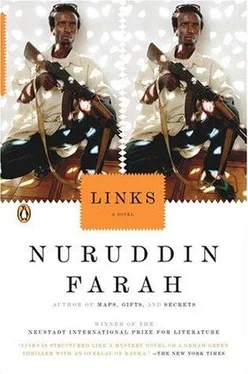“I will.”
“Thanks.”
“Do be watchful,” Bile advised, “and stay calm.”
“I will,” Jeebleh said, and disconnected. He turned and felt a nervous change in his surroundings. He heard the hotel gate open. A huge man waddled in: Caloosha, making a dramatic entrance.
At once everybody tried to be useful to him, the men at the gate opening it wider, others standing to attention. A handful of bodyguards, among them Kaahin and men he had seen earlier, walked beside him and behind, their guns at the ready. Ali arrived pronto, half running. He stopped a few meters before the visiting VIP, then bowed as if to royalty. Caloosha dismissed everyone, including his bodyguards and the manager, and moved to a café table nearby. He sat down with the slowness of a hippo that had eaten its fill, and summoned Jeebleh and Af-Laawe. As he approached, Jeebleh could tell that Caloosha was in a rage, glowering at Af-Laawe. “Where did you go?”
“To eat,” Af-Laawe said sheepishly.
Now Caloosha said to Jeebleh, “Did he drink?”
Jeebleh couldn’t control himself. “What does it matter if Af-Laawe has taken a drink? My concern here is about death. Did you have a hand in it? Was I supposed to be here when the youths sneaked into my room? Is this why you’re asking Af-Laawe where we went?”
“There’s been a lapse in your security,” Caloosha said.
He couldn’t believe his ears: “A lapse in my security?”
“And Af-Laawe is responsible for it.”
“What does ‘a lapse in security’ mean?”
“Someone who was supposed to be here wasn’t.”
“And Af-Laawe is to blame?” Jeebleh asked.
Night had descended early in Af-Laawe’s eyes, and he hung his head in despair — his ear, in Jeebleh’s disturbed thinking, assumed the shape of a full-grown bat.
Jeebleh turned to Af-Laawe. “If there is something you haven’t told me, please speak up.”
“We were supposed to go to Caloosha’s house,” Af-Laawe replied, “where you were to meet the clan elders and apologize. But I took you to my favorite restaurant instead. Caloosha thinks that the incident with the dog is my fault too, because I was supposed to keep you company and out of mischief.”
“Am I a child, whose every activity must be supervised, lest it be seen as mischievous?” Jeebleh said. “Am I to be told when to apologize to self-serving elders?”
“That’s no way to react,” Caloosha said.
Jeebleh spoke at the top of his voice, clearly impervious to the reaction of those in his vicinity. “Am I not a venerable elder myself, not of a clan, God forbid, but just a venerable elder? To earn everyone’s respect, do I need to put on two robes dipped in mud and then dried before I wear them?”
Caloosha kept silent.
“Who is the dead boy?”
“The son of one of the clan elders, whom you insulted earlier today and sent off empty-handed,” Caloosha replied.
“Will there be other deaths because of his?”
“That can’t be helped!”
“I don’t want any more deaths, not on my account,” Jeebleh said. “I forbid you to let your mad dogs loose on the family of the dead boy. There have been enough mindless killings already. I forbid you to kill on my account, my conscience won’t allow it.”
Caloosha met Jeebleh’s earnestness with sarcasm. “Sadly, I don’t have a conscience.”
“It’s high time you reactivated one.”
“I’m afraid I cannot,” he said, mimicking Jeebleh’s serious tone, “as I sold my conscience to the devil to pay for a mortgage on the house of my self-promotion. To date I’ve survived on the proceeds, and I doubt I want to buy it back, thank you!”
“Hell was invented for your kind.”
“I am sure it was!” Caloosha bellowed.
Before either managed to raise the stakes any further, Dajaal was standing there between them, unarmed. Caloosha’s bodyguards closed in on him and waited for instructions.
Caloosha held his rage in check, his eyes fixed on Jeebleh, then on Dajaal. “Why are you here?”
“Don’t ask me,” Dajaal said calmly. “Ask Jeebleh.”
Af-Laawe got up and walked to a spot he seemed to calculate as beyond the range of a stray bullet. Caloosha, meanwhile, gestured to his bodyguards to relax.
“I’m going to spend a couple of nights at Bile’s,” Jeebleh said, “and then decide what to do.”
“Why not move in with me?” asked Caloosha.
“Let’s talk in a couple of days, and maybe I will.” And to the manager, Jeebleh called, “My bags, please!”
“We’ll beef up security,” Ali promised.
Jeebleh assured him that he had wanted to spend a couple of days with Bile anyway. When he was paying his bill, he saw Caloosha eyeing the manager and shaking his head, indicating that he shouldn’t accept the money.
“Take an overnight bag,” Caloosha suggested, “and then return in two days. Look how well I compromise!”
“I promise I will visit you, Caloosha!” Jeebleh said. He asked Dajaal to take his bags to the car. He hoped he wasn’t making more unnecessary enemies out of Caloosha, the manger, or Af-Laawe. He was determined to buy himself time: to think, to figure out whom to trust, to plot. “I want to see you both,” he told Caloosha and Af-Laawe, “when I come to the north. Now, before I go, do you have any news about Faahiye, Raasta, or my mother’s housekeeper?”
“We’re working on the assignments,” Caloosha said, his mockery gentler, even friendly, now.
“Patience!” Af-Laawe added.
Jeebleh waited in silence until everybody seemed relaxed, in particular Caloosha’s bodyguards. He stole a glance at Dajaal and by chance intercepted a communication between him and Kaahin. He didn’t know what to make of it; didn’t know whether he should view it as harmful to his own prospects for survival. Death is your most intimate neighbor when you are in Mogadiscio, Jeebleh thought, as he went out of the hotel gate, speaking to no one but also showing no sign of fear.
O vengeance of the Lord…
I saw so many flocks of naked souls,
all weeping miserably. .
Some lay upon the ground, flat on their backs;
some huddled in a crouch, and there they sat
. . supine in punishment.
(CANTO XIV)
. . With all of Ethiopia
or all the land that borders the Red Sea—
so many, such malignant, pestilences.
Among this cruel and depressing swarm,
ran people who were naked, terrified,
with no hope of a refuge or a curse.
(CANTO XXIV)
DANTE, Inferno

JEEBLEH WAS IN SUCH DISTRESS THAT HE FELT HE COULD LIVE ONLY ONE minute at a time. He was unable to remember things in any detail; concepts like “an hour ago,” “yesterday,” “tomorrow,” “last week,” “next week” were meaningless with all that had taken place.
He was certain that staying on in Mogadiscio would not be the same — even if he had no way of knowing whether his own actions had factored into the killing of the youth in the hotel. He reviewed the events, and everything became suspect. Was the young man running away, out of the room, when the bullet struck him dead? Did he mean to kill Jeebleh, and if so, why? Was it because he had insulted the clan elders, or because he had been kind to the Alsatian in labor?
Disoriented by the urgency of his existence, and stymied by the demands on his time, Jeebleh had acquired other priorities, besides and beyond finding his mother’s grave and paying her his respects. He had lost his way in the labyrinthine politics of the place, and the labyrinth seemed to have Caloosha at its center. The man had had a wicked hand in his and Bile’s detention; another in encouraging the elders of the clan to call on him to extract the funds they needed; and yet another in having him shadowed from the instant he landed. If he had the wherewithal to have Jeebleh tailed to wherever he went, to “provide him with protection,” as he put it, it followed that he also had the means to have him killed if he so chose.
Читать дальше













